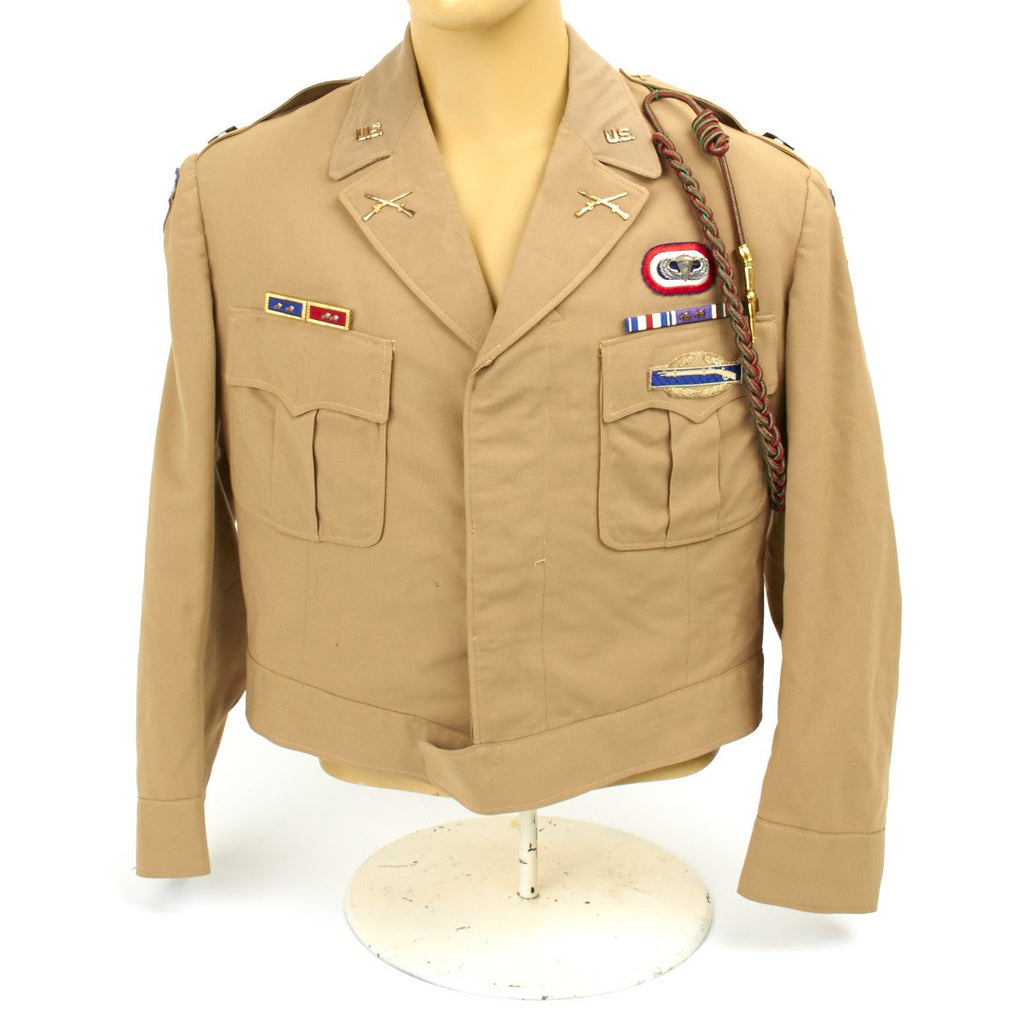Item Description
Original Item: Only one available. This is a large size US 42 private purchase unnamed summer weight Khaki Ike style Jacket for a Captain in the 82nd Airborne. He also saw service with the US Army Anti Aircraft Command.
Patches, ribbons, awards are as follows (please note that as this jacket is unnamed we cannot verify that all of these are correct for this soldier, but are WW2 era).
Left Chest:
Parachutist badge with 1 bronze star- indicates one combat jump
82nd Airborne Background Trimming
Ribbon Bar:
Silver Star
Purple Heart with two Bronze Oak Leaves
WWII - Europe-Africa-Middle East Medal - (1941-45) with three bronze stars
Left Pocket:
Combat Infantryman Badge
Right Arm:
82nd Airborne Division Patch
Left Arm
Anti-Aircraft Command Patch with Airborne banner
Right Chest:
Blue: Presidential unit citation
Red: Army Meritorious Unit Citation with two oak leaf clusters (one appears to be missing)
Fourragère shoulder cord for service with French combat units.
History of the 82nd Airborne Division in World War Two:
The 82nd Airborne Division is an active duty airborne infantry division of the United States Army, specializing in parachute assault operations into denied areas. Based at Fort Bragg, North Carolina, the 82nd Airborne Division is part of the XVIII Airborne Corps.
The 82nd Division was constituted in the National Army on 5 August 1917, and was organized on 25 August 1917, at Camp Gordon, Georgia. Since its initial members came from all 48 states, the unit acquired the nickname All-American, which is the basis for its famed AA shoulder patch. Famous soldiers of the division include Sergeant Alvin C. York, General James M. Gavin, Senator Strom Thurmond (325th GIR in World War II), Senator Jack Reed, and Congressman Patrick Murphy (the first Iraq War veteran elected to Congress).
The 82nd Division was first constituted on 5 August 1917 in the National Army. It was organized and formally activated on 25 August 1917 at Camp Gordon, Georgia. The division consisted entirely of newly conscripted soldiers. When commanders discovered that the division contained draftees from the forty-eight U.S. states that existed at the time, they nicknamed it "the All-American division."
The bulk of the division was two infantry brigades, each commanding two regiments. The 163rd Infantry Brigade commanded the 325th Infantry Regiment and the 326th Infantry Regiment. The 164th Infantry Brigade commanded the 327th Infantry Regiment and the 328th Infantry Regiment. Also in the division were the 157th Field Artillery Brigade, composed of the 319th, 320th and 321st Field Artillery Regiments and the 307th Trench Mortar Battery; a divisional troops contingent, and a division train. It sailed to Europe to join the American Expeditionary Force in fighting World War I.
Louisiana to Italy
The 82nd Division was re-designated on 13 February 1942 as Division Headquarters, 82nd Division. It was recalled to active service on 25 March 1942, and reorganized at Camp Claiborne, Louisiana, under the command of Major General Omar N. Bradley.
During this training period, the division brought together four officers who would ultimately steer the US Army during the following two decades: Matthew B. Ridgway, Matthew D. Query, James M. Gavin, and Maxwell D. Taylor who became the commander of the 101st Airborne Division in 1944. This was following Bill Lee's heart attack. Under General Bradley, the 82nd Division's Chief of Staff was George Van Pope. The Allied invasion of Sicily was originally to be kept a secret.
On 15 August 1942, the 82nd Infantry Division became the Army's first airborne division, and was re-designated the 82nd Airborne Division. In April 1943, its paratroopers deployed to North Africa under the command of Major General Matthew B. Ridgway to take part in the campaign to invade Italy. The division's first two combat operations were parachute assaults into Sicily on 9 July and Salerno on 13 September. The initial assault on Sicily, by the 505th Parachute Infantry Regiment, was the first regimental-sized combat parachute assault conducted by the United States Army. The first glider assault did not occur until Operation Neptune as part of D-Day. Glider troopers of the 319th and 320th Glider Field Artillery and the 325th Glider Infantry instead arrived in Italy by landing craft at Maiori (319th) and Salerno (320th, 325th).
In January 1944, the 504th Parachute Infantry Regiment, which was temporarily detached to fight at Anzio, adopted the nickname "Devils in Baggy Pants", taken from an entry in a German officer's diary. While the 504th was detached, the remainder of the 82nd moved to the United Kingdom in November 1943 to prepare for the liberation of Europe. See RAF North Witham and RAF Folkingham.
Normandy
With two combat assaults under its belt, the 82nd Airborne Division was now ready for the most ambitious airborne operation of the war so far, as part of Operation Neptune, the invasion of Normandy. The division conducted Operation Boston, part of the airborne assault phase of the Operation Overlord plan.
In preparation for the operation, the division was reorganized. To ease the integration of replacement troops, rest, and refitting following the fighting in Italy, the 504th did not rejoin the division for the invasion. Two new parachute infantry regiments (PIRs), the 507th and the 508th, provided it, along with the 505th, a three-parachute infantry regiment punch. On 5 and 6 June, these paratroopers, parachute artillery elements, and the 319th and 320th, boarded hundreds of transport planes and gliders to begin history's largest airborne assault at the time (only Operation Market Garden later that year would be larger). During the June 6th assault, a 508th platoon leader, Lt. Robert P. Mathias, would be the first American officer killed by German fire on D-Day On June 7, after this first wave of attack, the 325th Glider Infantry Regiment would arrive by glider to provide a division reserve.
By the time the All-American Division was pulled back to England, it had seen 33 days of bloody combat and suffered 5,245 troopers killed, wounded, or missing. Ridgway's post-battle report stated in part, "33 days of action without relief, without replacements. Every mission accomplished. No ground gained was ever relinquished."
Following Normandy, the 82nd became part of the newly organized XVIII Airborne Corps, which consisted of the U.S. 17th, 82nd, and 101st Airborne Divisions. Ridgway was given command, but was not promoted to lieutenant general until 1945. His recommendation for succession as commander was Brigadier General James M. Gavin. Ridgway's recommendation met with approval, and upon promotion Gavin became the youngest general since the Civil War to command a US Army division.
Market Garden
On 2 August 1944 the division became part of the First Allied Airborne Army. In September, the 82nd began planning for Operation Market Garden in the Netherlands. The operation called for three-plus airborne divisions to seize and hold key bridges and roads deep behind German lines. The 504th, now back at full strength, was reassigned to the 82nd, while the 507th was assigned to the 17th Airborne. On 17 September, the 82nd conducted its fourth World War II combat assault. Fighting off German counter-attacks, the 82nd captured its objectives between Grave, and Nijmegen. Its success, however, was short-lived because the defeat of other Allied units at the Battle of Arnhem. After a period of duty on the Arnhem front, the 82nd was relieved by Canadian troops, and sent to France.
The Bulge
On 16 December, the Germans launched a surprise offensive through the Ardennes Forest which became known as the Battle of the Bulge. Two days later the 82nd joined the fighting and blunted General Gerd von Rundstedt's northern penetration of American lines. During this campaign, PFC Martin, 325th Glider Infantry Regiment, told a sergeant in a retreating tank destroyer to, "pull your vehicle behind meI'm the 82nd Airborne, and this is as far as the bastards are going!"
After helping to secure the Ruhr, the division ended the war at Ludwigslust past the Elbe River, accepting the surrender of over 150,000 of Lieutenant General Kurt von Tippelskirch's 21st Army. General Bradley stated in a 1975 interview with Gavin that Montgomery told him German opposition was too great to cross the Elbe. When Gavin's division crossed the river, the division moved 36 miles in one day and captured over 100,000 troops, causing great laughter in Bradley's 12th Army Group headquarters.
Following Germany's surrender, the 82nd entered Berlin for occupation duty, lasting from April until December 1945. In Berlin General George Patton was so impressed with the 82nd's honor guard he said, "In all my years in the Army and all the honor guards I have ever seen, the 82nd's honor guard is undoubtedly the best." Hence the "All-American" became also known as "America's Guard of Honor". The war ended before their scheduled participation in the invasion of Japan. During the invasion of Italy in World War II, Ridgway considered Will Lang Jr. of TIME magazine an honorary member of the division.
The 82nd returned to the United States 3rd January 1946. Instead of being demobilized, the 82nd made its permanent home at Fort Bragg, North Carolina and was designated a regular Army division on 15th November 1948.
After nearly two years overseas and 442 days in combat, the war ended for the All Americans.
Awards
Medals of Honor 3
1st Sgt. Leonard Funk, Jr., Pfc. Charles N. Deglopper, Pte John R. Towle)
Distinguished Service Crosses 79
Silver Star 894
Bronze Star Medals 2,478
numerous other US and foreign decorations.
Casualties
1,619 killed in action
6,560 wounded in action
332 died of wounds
To commemorate the 1944 Waal assault river crossing made by the 504th Parachute Infantry Regiment and the 307th Engineer Battalion (Airborne) during Operation Market Garden, an annual Crossing of the Waal competition is staged on the anniversary of the operation at McKellar’s Lake near Fort Bragg. The winning company receives a paddle. The paddle signifies that in the original crossing, many paratroopers had to row with their weapons because the canvas boats lacked sufficient paddles.
- This product is available for international shipping.
- Eligible for all payments - Visa, Mastercard, Discover, AMEX, Paypal & Sezzle





















